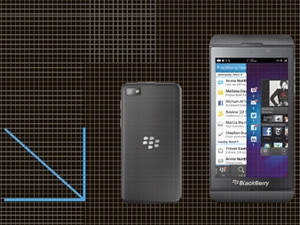
There's no denying that BlackBerry has undergone a trial by fire recently. As a darling of the international smartphone market, the brand enjoyed the kind of adulation and fierce evangelism one might associate with the likes of Coca-Cola or McDonald's. Known for its e-mail-friendly handsets and light-on-the-pocket BlackBerry Internet Service (BIS) data packages, by end 2010, this once minor Canadian mobile start-up had transformed itself into a global giant.
In mid-2011, things began to take a turn for the worse. The desirability of BlackBerry's secure, corporate-friendly BIS and BlackBerry Enterprise Server (BES) network began to lose traction to more striking handsets introduced by the likes of Apple and Samsung, while frequent regional data outages only served to aggravate consumers.
In June 2011, for the first time in nine years, BlackBerry (then Research In Motion) forecast a decline in revenue and subsequently reduced its global workforce by 11%.
After undergoing several highly publicised internal management shifts and a revision of its corporate identity (RIM to BlackBerry), BlackBerry is now pinning its hopes of global re-emergence on BB10, a new operating system that fundamentally rethinks the way users interact with the brand.
In theory, this approach is a positive step forward for an ailing organisation. In practice, however, some voices are beginning to question whether this strategy will sideline BlackBerry's only remaining outpost of enthusiastic support - the emerging market.
Emerging markets
In many ways, BlackBerry is the David Hasselhoff of smartphone manufacturers. While battling declining market share in established countries such as the US, the brand continues to enjoy strong growth in a handful of emerging territories.
Locally, BlackBerry's uncapped R59-per-month BIS data package quickly positioned the company as a leader in entry-level smartphone ownership. The sheer affordability of this offer, coupled with consumer-friendly handset costs, saw millions of South Africans wholeheartedly embrace the brand.
These handsets introduced many low-income earners to the benefits of mobile connectivity. Put simply, before BlackBerry BIS arrived, affordable Internet access for the working man did not exist.
Although BlackBerry continues to experience growth within the local market, this progress is highly dependent on the availability of an affordable uncapped service offering.
In many ways, BlackBerry is the David Hasselhoff of smartphone manufacturers.
Upon the recent announcement of BB10 in SA, several industry players confirmed that the revitalised OS would not make use of the BlackBerry Internet Services network. Such a development would render uncapped packages obsolete - arguably marginalising the brand's most adoring local user base.
Although the jury is still out on how this might affect BlackBerry's South African market share, there's little doubt that BB10 will alter the brand's local dynamic.
In order to comprehend the shifting tides that are disputably eating away at BlackBerry's South African foundation, it's important to have a clear understanding of the way in which BB10 interacts with mobile networks.
New and improved?
There's a strong suggestion that BB10 will do away with local uncapped packages in favour of a better user experience, with BlackBerry adding that the revitalised platform will offer 'a completely new and unique mobile computing experience'.
Fortunately for current BlackBerry evangelists, BlackBerry OS 7 handsets and pricing models will not be affected. Still, it's hard not to wonder how this new dynamic might affect the organisation's local market share in years to come.
Historically, BlackBerry handsets have accessed the broader Web via the organisation's private infrastructure. Using either BIS or BES, its corporate equivalent, millions of handset owners across the globe are able to connect to the Internet while simultaneously making use of brand-specific services such as BlackBerry Messenger (BBM). This traffic terminates on BlackBerry's 'blackberry.net' APN.
Although this is a relatively simple explanation, it outlines the attractiveness of the organisation's traditional offering - both from a network security and value-added services perspective.
Significantly, BB10 traffic will terminate on the 'Internet' APN, eliminating BlackBerry's ability to broker uncapped agreements with local operators. According to both BlackBerry and South African mobile providers, the decision to move away from its previous approach to connectivity was based on an effort to enhance the overall user experience.
Pricing models
Furthermore, BlackBerry has also ensured that handset owners currently making use of BlackBerry OS 7 offerings will not experience any change in pricing models.
Such a development would render uncapped packages obsolete - arguably marginalising the brand's most adoring local user base.
Although local operators made several data package options available to BB10 users, an affordable uncapped offering was not included.
While this doesn't leave BlackBerry's installed local user base in a quagmire just yet, it raises several questions relating to the future of the brand in SA. As old devices are gradually phased out, it's impossible not to wonder how consumers might react to the new, less attractive status quo.
First published in the April 2013 issue of ITWeb Brainstorm magazine.
* Article first published on brainstorm.itweb.co.za
Share